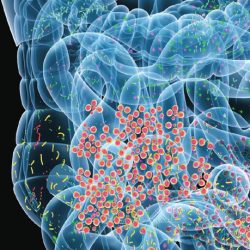A study from Inserm, Paris Descartes University and Sainte Anne Hospital suggests that anorexia nervosa might not be explained by fear of gaining weight, but by the pleasure of losing it... and that the phenomenon might be genetically influenced. Published in Translational Psychiatry, this study, directed by Prof. Gorwood, head of the Clinic for Mental and Brain Diseases, … [Read more...]
Weight Management

Prevalence of obesity in U.S. increases among women: JAMA Study
The prevalence of obesity in 2013- 2014 was 35 percent among men and 40 percent among women, and between 2005 and 2014, there was an increase in prevalence among women, but not men, according to a study appearing in the June 7 issue of JAMA. Between 1980 and 2000, the prevalence of obesity increased significantly among adult men and women in the United States; further … [Read more...]
One hour of driving a day = 2.3kg more weight and 1.5cm wider waist, study reveals
People who drive an hour or more a day are 2.3kg heavier and 1.5cm wider around the waist compared to people who spend 15 minutes or less in their cars, research has revealed. These findings from a research study led by Professor Takemi Sugiyama from the Australian Catholic University's Institute of Health and Ageing, show the convenience of car travel has a significant … [Read more...]
Current apps on weight management lack certification from health authorities
Overweight and obese people are turning to a multitude of smartphone apps to help them lose weight. But new research presented at the European Obesity Summit (Gothenburg, Sweden, June 1-4) says that only 17 (0.5%) of the apps identified by the researchers have been developed by a certified health organisation or university. Nor are there any published evidence of effectiveness … [Read more...]
Can someone with anorexia get better?
The answer is Yes. Someone with anorexia can get better. A health care team of doctors, nutritionists, and therapists will help the patient get better. They will: Help bring the person back to a normal weight Treat any psychological issues related to anorexia Help the person get rid of any actions or thoughts that cause the eating disorder These three steps will prevent … [Read more...]
Converting cells to burn fat, not store it: A McGill University Study
Researchers have uncovered a new molecular pathway for stimulating the body to burn fat -- a discovery that could help fight obesity, diabetes and cardiovascular disease. In a study published in the journal Genes & Development, a team led by researchers from the Department of Biochemistry at McGill University focus on a protein known as folliculin and its role in … [Read more...]
Regular Physical Activity is the ‘Magic Bullet’ for pandemics of obesity and cardiovascular disease: Florida Atlantic University Study
In an editorial published in the current issue of Cardiology, professors from the Charles E. Schmidt College of Medicine at Florida Atlantic University have evaluated the totality of evidence and conclude that regular physical activity bears the closest resemblance to a "magic bullet" to combat the worldwide epidemic of obesity and cardiovascular disease. The statistics on … [Read more...]
Tweeting your weight loss? Is there a link between microblogging, eating disorders?
In a new open access article for Cogent Social Sciences; Mobile Exercising and Tweeting the Pounds Away: The Use of Digital Applications and Microblogging and their Association with Disordered Eating and Compulsive Exercise, researchers from Georgia College & State University, and Chapman University explore the relationship between social media, eating disorders, and … [Read more...]
Obesity cause disease in organs distant from those where fat accumulates: A Study
Obesity is on the rise throughout the world, and in some developed countries two-third of the adult population is either overweight or obese. This brings with it an increased risk of serious conditions such as heart disease, stroke, cancer and osteoarthritis. Many of these conditions do not appear to affect the parts of the body where the excess fat accumulates, but rather to … [Read more...]
Epigenetic modification increases susceptibility to obesity and predicts fatty liver: A German Study
Scientists of the German Center for Diabetes Research (DZD) led by the German Institute of Human Nutrition (DIfE) have shown in a mouse model that the epigenetic* modification of the Igfbp2** gene observed in the young animal precedes a fatty liver in the adult animal later in life. In addition, young animals with this modification exhibit impaired glucose metabolism and are … [Read more...]
Abdominal fat accumulation prevented by unsaturated fat: Uppsala University Study
New research from Uppsala University shows that saturated fat builds more fat and less muscle than polyunsaturated fat. This is the first study on humans to show that the fat composition of food not only influences cholesterol levels in the blood and the risk of cardiovascular disease but also determines where the fat will be stored in the body. The findings have recently been … [Read more...]
Lead linked to obesity: University of Michigan Study
When we think of ill effects from lead exposure various neurologic problems usually come to mind. Now researchers at the University of Michigan say another health impact can be added to the list: obesity. Even at low levels, lead is associated with obesity in mice whose mothers were exposed to the chemical, researchers at the U-M School of Public Health found. Specifically … [Read more...]
Early antibiotic exposure leads to lifelong metabolic disturbances: A Study
A new study published in Cell suggests that antibiotic exposure during a critical window of early development disrupts the bacterial landscape of the gut, home to trillions of diverse microbes, and permanently reprograms the body's metabolism, setting up a predisposition to obesity. Moreover, the study shows that it is altered gut bacteria, rather than the antibiotics, driving … [Read more...]
Crowdsourcing may help dieters lose weight: A Study
Crowdsourcing may help dieters stick to healthy foods and lose weight, as participants are as good as trained experts at correctly rating the healthiness of foods and giving feedback on them, indicates research published online in the Journal of the American Medical Informatics Association. Being able to track energy intake and getting personalized feedback on diet have been … [Read more...]
Obesity paradox in survival from sepsis: University of Michigan Study
University of Michigan Health System researchers revealed an obesity paradox among older Americans suffering from sepsis. In a study of 1,404 Medicare beneficiaries, heavier patients were more likely to survive sepsis, a life-threatening infection that can lead to a stay in a hospital's intensive care unit. The findings, published in the August issue of Critical Care … [Read more...]
Losing weight won’t necessarily make you happy: University College London Study
In a study of 1,979 overweight and obese adults in the UK, people who lost 5% or more of their initial body weight over four years showed significant changes in markers of physical health, but were more likely to report depressed mood than those who stayed within 5% of their original weight. The research, published in PLOS ONE, highlights the need to consider mental health … [Read more...]
Cell signaling pathway linked to obesity and type 2 diabetes: Purdue University Study
A Purdue University study shows that Notch signaling, a key biological pathway tied to development and cell communication, also plays an important role in the onset of obesity and Type 2 diabetes, a discovery that offers new targets for treatment. A research team led by Shihuan Kuang, associate professor of animal sciences, found that blocking Notch signaling in the fat … [Read more...]
Anorexia fueled by pride about weight loss: Rutgers University Study
Positive emotions -- even those viewed through a distorted lens -- may play an exacerbating role in fueling eating disorders like anorexia nervosa, which has a death rate 12 times higher for females between the ages of 15 and 24 than all other causes of death combined, according to a Rutgers study. In research published in Clinical Psychological Science, Edward Selby, an … [Read more...]
Obese or anorexic individuals react differently to taste: University of Colorado Study
Researchers at the University of Colorado Anschutz Medical Campus have discovered that women suffering from anorexia nervosa and those who are obese respond differently to taste, a finding that could lead to new treatments for the eating disorders. "Taste is an important driver of food intake and invariably associated with distinct neuronal patters in the insula, the brain's … [Read more...]
High cost of fruits, vegetables linked to higher body fat in young children: American University Study
High prices for fresh fruits and vegetables are associated with higher Body Mass Index (BMI) in young children in low- and middle-income households, according to American University researchers in the journal Pediatrics. "There is a small, but significant, association between the prices of fruit and vegetables and higher child BMI," said Taryn Morrissey, the study's lead … [Read more...]
Program participation results in long-term weight loss: University of Colorado Study
Researchers from the University of Colorado Anschutz Medical Campus have found that losing even a modest amount of weight can reap significant rewards, including lower blood pressure, lower blood sugar, improved sleep, and fewer aches and pains. But losing weight is difficult and maintaining that loss over years is even harder. The vast majority of those who lose weight gain … [Read more...]
Clues to curbing obesity found in neuronal ‘sweet spot’: Yale School of Medicine Study
Preventing weight gain, obesity, and ultimately diabetes could be as simple as keeping a nuclear receptor from being activated in a small part of the brain, according to a new study by Yale School of Medicine researchers. Published in the Aug. 1 issue of The Journal of Clinical Investigation (JCI), the study showed that when the researchers blocked the effects of the nuclear … [Read more...]
Physical activity increases after weight loss surgery: University of Leicester Study
People who have their stomach size surgically reduced move around more and easier after weight loss surgery, a study has found. Patients are able to walk further and are more physically active in the first year following the procedure, according to the research. Although patients have an increased step count (they walk further), the intensity of the exertion is lower in … [Read more...]
New potential marker for obesity: University of Kentucky Study
A new study led by University of Kentucky researchers and published in Nature shows a potential new biological marker for the development of obesity and a possible target for obesity prevention and treatment. Neurotensin (NT), a peptide produced mainly in the gastrointestinal tract and central nervous system, is released with fat ingestion and facilitates fatty acid … [Read more...]
Brain response to appetizing food cues varies among obese people: A Study
People who have the most common genetic mutation linked to obesity respond differently to pictures of appetizing foods than overweight or obese people who do not have the genetic mutation, according to a new study published in the Endocrine Society's Journal of Clinical Endocrinology & Metabolism (JCEM). More than one-third of adults are obese. Obesity typically results … [Read more...]
Hope for the overweight: Better understanding of types of fat could lead to new treatments: A German Study
The body has different types of adipose tissue that perform various metabolic tasks: white, beige and brown. For the first time, researchers at the Helmholtz Zentrum München and Harvard Medical School have successfully identified specific surface proteins that can help distinguish between the three types. This discovery makes it possible to develop new treatment options for … [Read more...]
Body mass index (BMI) value increased in the general population over a period of 3 decades: Copenhagen University Study
In a study appearing in the May 10, 2016 issue of JAMA, Børge G. Nordestgaard, M.D., D.M.Sc., of Copenhagen University Hospital, Herlev, Denmark and colleagues examined whether the body mass index (BMI) value that is associated with the lowest all-cause mortality has increased in the general population over a period of 3 decades. Previous findings indicate that while average … [Read more...]
Rates of overweight children are declining in Canada: University of Manitoba Study
After years of increases, the rates of children who are overweight or obese are declining in Canada, according to new research in CMAJ (Canadian Medical Association Journal) Between 1978 and 2004, there was a significant increase in Canada in the rates of children who are obese or overweight aged 2 to 17 years, from 23.3% to 34.7%, using the World Health Organization's (WHO) … [Read more...]
Heavy body shape linked with highest mortality: A Study
People who are lean for life have the lowest mortality, while those with a heavy body shape from childhood up to middle age have the highest mortality, reveal findings of a large study published in The BMJ. Obesity has become a public health crisis in most countries worldwide. While high body mass index in adulthood has been linked to increased mortality risk, uncertainty … [Read more...]
Link between obesity in young and lowering of age of puberty: Plymouth University Study
A new link has been identified between obesity in childhood and the lowering of the age of puberty. The research which discovered the link, carried out at Plymouth University Peninsula Schools of Medicine and Dentistry, is published in the Journal of Clinical Endocrinology and Metabolism. The study focuses on a protein called sex hormone-binding globulin (SHBG), the … [Read more...]
- « Previous Page
- 1
- …
- 3
- 4
- 5
- 6
- 7
- …
- 27
- Next Page »




























